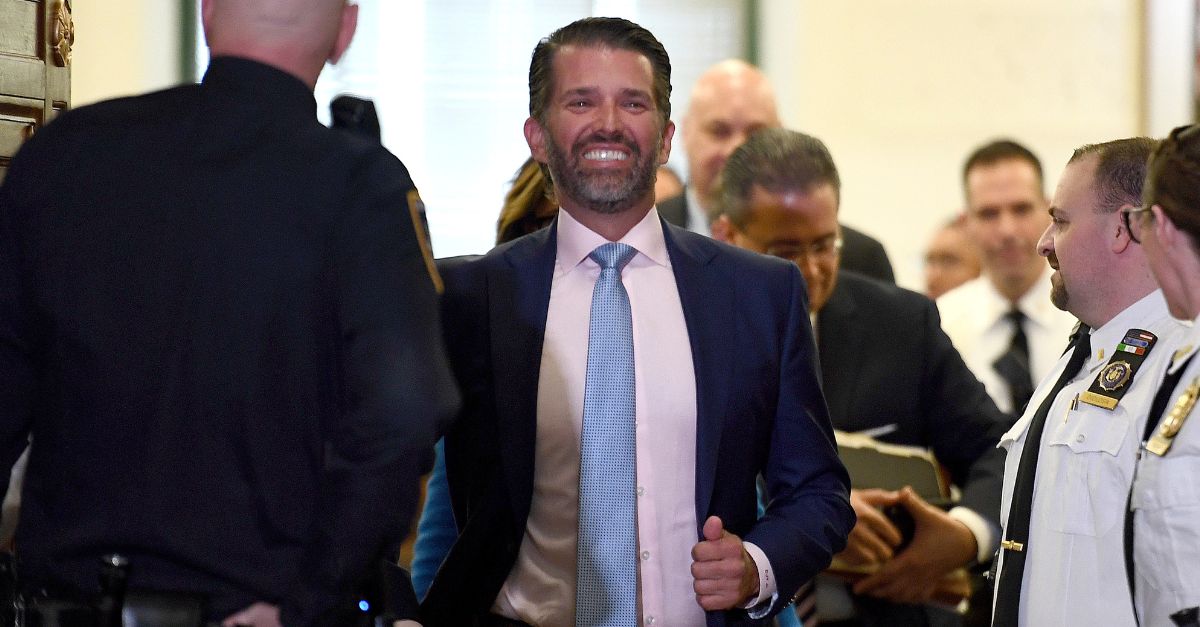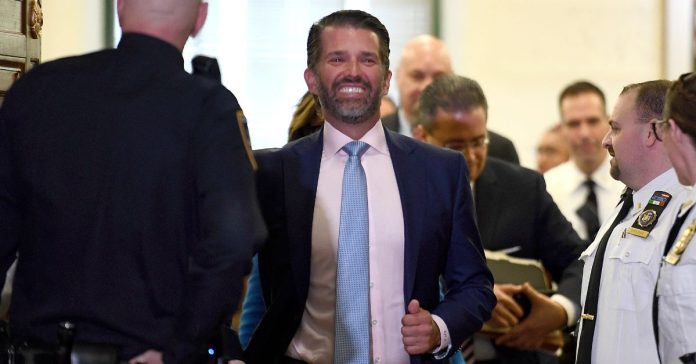
Donald Trump Jr. leaves courtroom during court break in the civil fraud trial of his father, the former U.S. President Donald Trump, New York, NY, November 2, 2023. (Photo by Anthony Behar/Sipa USA)(Sipa via AP Images)
Donald Trump, Jr. returned to a courthouse in lower Manhattan on Thursday morning for a second day of testimony in his father’s and namesake family business’ ongoing civil fraud trial.
In line with his earlier responses to questions posed by the state and the court, the former president’s eldest son maintained a jocular attitude while keeping his answers curt and guarded.
Trump Jr. repeatedly sought to shift responsibility onto the company’s accountants, lawyer, and bankers for various classes of documents already deemed fraudulent by the judge overseeing the case – while admitting he likely signed several such documents over the course of his tenure as a trustee for the Trump Organization.
One of the first documents shown to Trump Jr. on Thursday was a loan document from Deutsche Bank Trust Company Americas from March 2017 – after his father had assumed the role of the U.S. president and delegated control of the family’s business empire to his children. On that document, Trump Jr. signed as an “attorney in fact” for his father, according to The Messenger’s Adam Klasfeld.
That loan document required the signatory to attest: “The foregoing presents fairly in all material respects the financial condition of Guarantor at the period presented.” When asked about the document, Trump Jr. said he didn’t recall it specifically but acknowledged he often signed and attested to such statements.
“I’m sure I’ve signed dozens of these [certifications] in my time as trustee,” the witness testified.
Trump Jr. was also shown one of his father’s statements of financial condition from June 2017. That document noted that trustees were responsible for affirming the accuracy of such reports, according to counsel for the New York Attorney General’s Office.
In September, New York Supreme Court Justice Arthur Engoron’s order specifically found the 45th president and his business frequently committed fraud on years worth of statements of financial condition by inflating Donald Trump’s personal net worth and grossly overvaluing company assets in order to bilk banks and insurance companies so that they could “transact business.”
Trump Jr. became a Trump Organization trustee in 2017 and remained a trustee for all of 2018, 2019, and 2021. The witness’ father restored himself as a trustee on Jan. 15, 2021, company records show.
In response to a series of questions from the attorney general’s counsel about his involvement in those statements of financial condition, Trump Jr. offered a quick laugh and said: “Rinse and repeat.”
Several key issues remain outstanding despite the prior finding of fraud – including what will ultimately happen to the Trump Organization’s business licenses in the Empire State and the size of the disgorgement, or fine, the company will have to pay.
To determine the extant questions, the court is highly concerned with questions of intent for the false valuations.
Trump Jr., in response to repeated questioning about his own intent as a signatory on the documents, sought to inject a certain amount of grey into the equation by saying: “I don’t know that I intended for them to do anything. I’m signing off on it. It’s not as simple as ‘yes or no.””
On the one hand, he freely admitted to signing those papers and said he would have no problem with banks relying on the figures contained in the statements of financial condition. On the other hand, he repeatedly insisted that professional accountants were responsible for drawing up those numbers in the first place. And, in that regard, Trump Jr. argued, it was only natural for him to rely on the number-crunchers’ work – the job they were paid to do.
In sum, Trump Jr. testified for roughly three hours. His second day of testimony was largely a reiteration of his first.
The underlying investigation into the Trump Organization by New York Attorney General Letitia James (D), which dates back to 2019, is premised on sworn congressional testimony from Trump’s former friend and fixer Michael Cohen. Under questioning by Rep. Alexandria Ocasio-Cortez, D-N.Y., Cohen claimed the Trump Organization inflated assets to insurance companies and that the company’s tax returns likely contained similar financial improprieties.
Trump has been held in contempt for failing to properly respond to subpoenas in the case – though the financial punishment was later set aside after curing the defects in those subpoena responses. He and two of his children later tried and failed to have the overarching lawsuit transferred to a different judge. Also in September, Trump sued Engoron. Earlier this month, Trump dropped that lawsuit.
Over and over on Thursday, prosecutor Colleen Faherty pressed the witness on his certifications to banks that they could rely on the statements of financial condition. In turn, Trump Jr. replied that lawyers and accountants advised him there was nothing untoward going on and that he, himself, did not prepare the statements.
As for the banks that were lied to, he said in response to one question, they should have performed their own due diligence.
Near the end of his testimony, Engoron cut to the heart of the matter and reportedly asked the businessman directly: “Mr. Trump, did you have anything to do with the statements of financial condition?”
To which Trump Jr. replied: “No, I did not, your honor.”
Have a tip we should know? [email protected]

